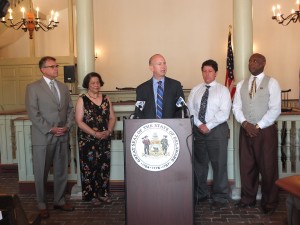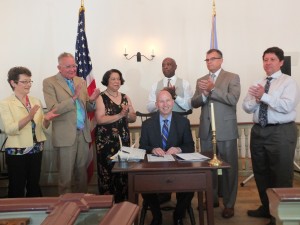Governor Signs Bills to Increase Transparency in Political Process
Former Governor Jack Markell (2009-2017) | News | Office of the Governor | Date Posted: Tuesday, July 22, 2014
Former Governor Jack Markell (2009-2017) | News | Office of the Governor | Date Posted: Tuesday, July 22, 2014
Wilmington, DE – Building upon significant legislative improvements made in recent years, Governor Markell today signed a package of bills to increase transparency and further improve Delaware’s campaign finance laws.

The new laws include the requirement in Senate Bill 186 that corporations or other entities must disclose the name and address of one “responsible party”—someone who shares or exercises direction or control over the entity’s activities. Previously, corporations could contribute without any person taking responsibility for the donation, making it more difficult for the public to determine who was behind a contribution. That bill was sponsored by Senator Margaret Rose Henry.
This change follows the Delaware Elections Disclosure Act of 2012, the first major overhaul of Delaware’s campaign finance laws in two decades, which improved transparency through disclosure requirements for third party advertisements, while providing better and timelier information to voters about groups supporting candidates. Additional legislation passed that year increased fines for campaign finance violations.
The legislation signed today at an event with legislators at the New County Courthouse Museum will also improve laws around campaign contributions and lobbying by:
“We must always look to improve our laws to strengthen the public’s confidence in the political process,” said Markell. “That work is never done, but we have made important progress in building on our efforts to increase transparency around campaign donations, while strengthening requirements for political candidates and lobbyists to disclose financial reports to the public. All of these efforts will help Delawareans better access information about their elected officials and the individuals and organizations that support them.”
Last month, the Governor signed another key election law reform measure, House Substitute 1 to House Bill 302, which creates a more unified and efficient structure for conducting elections, while making it easier to report and investigate campaign finance violations.
That legislation consolidates the 3 existing county Boards of Election into a single State Board of Elections, as recommended by the Title 15 Task Force. It also requires the State Election Commissioner to establish procedures that will allow citizens to report possible violations of Delaware’s campaign finance laws, including anonymous reports, and authorizes the Election Commissioner to hire investigators to examine possible violations and, if required, to refer such potential violations to the Attorney General for prosecution.

Statements from prime sponsors of the legislation
Senate Majority Whip Margaret Rose Henry (D-Wilmington East) on Senate Bill 186: “This will help strip away some of the mystery from who’s paying for political campaigns by giving voters more information about the groups providing financial support. It also will clear up questions for donors about how contributions need to be recorded in finance reports.”
Rep. Paul Baumbach (D-Newark) on House Bill 300: “Delaware has made significant improvements this year to its campaign finance system. One of those areas was building in detection and prosecution of violations. The best method to detect violations is to boost the number of detectives rooting out violations, and empowering citizens is a great way to accomplish that. To empower citizen detectives, we are providing protections and guarantees that reporting a campaign finance violation cannot lead to the person losing his or her job. The Whistleblowers’ Protection Act does just that, ensuring that employees who report or otherwise help uncover campaign finance violations are safe from being fired, threatened, or discriminated against.
Rep. Trey Paradee (D-West Dover) on House Bill 301: “Candidates often run into situations where they are handed a check from a joint account, which might be signed by one person, whereas the other person is not aware of the check being written. This law lays out clear procedures for how to handle these situations and to make sure all parties are aware of the contributions and that they are properly reported to the public.
Rep. Charles Potter Jr. (D-Wilmington North) on HB 304: “Last year the PIC received 322 financial disclosure reports, and 309 of them were submitted online. This law just makes everything uniform and cuts out one more step for the commission’s small staff, leaving them more time to act on complaints and fulfill requests from the public.”
Sen. Robert Marshall (D-Wilmington West) on Senate Bill 187: “Allowing candidates to donate contributions that may have been made in error or are illegal to charity is a better alternative than, in some cases, returning that money to a donor. With this law, we can use those contributions to help our senior citizens, children and families of our National Guard in times of need.”
Rep. Baumbach on House Bill 307: “There have been cases in the past when candidates for office failed to file disclosure forms on time or simply ignored the requirement altogether, and the public has no easy way to find out who. This is exactly the kind of documentation voters need to make the most informed choices about the people they want to represent them.”
Rep. Stephanie T. Bolden (D-Wilmington) on House Bill 303: “This new law eliminates paperwork that can be inconvenient for the person filing it and the commission, and any time we can use technology to make things more efficient, we should.”
Rep. Ed Osienski (D-Newark) on House Bill 306: “The state charges late fees for tax bills, car registration renewals, all kinds of licenses and other paperwork. It’s a common practice, and it’s a sum of money that reminds you to take care of your obligations in a timely fashion. This is about making sure the public has access to the latest information about lobbying activity in their government.”
PHOTOS Elections and Public Integrity Commission Bills Signing
Related Topics: campaignfinancelaws, ElectionsDisclosureAct, ResponsibleGovernment
Keep up to date by receiving a daily digest email, around noon, of current news release posts from state agencies on news.delaware.gov.
Here you can subscribe to future news updates.
Former Governor Jack Markell (2009-2017) | News | Office of the Governor | Date Posted: Tuesday, July 22, 2014
Wilmington, DE – Building upon significant legislative improvements made in recent years, Governor Markell today signed a package of bills to increase transparency and further improve Delaware’s campaign finance laws.

The new laws include the requirement in Senate Bill 186 that corporations or other entities must disclose the name and address of one “responsible party”—someone who shares or exercises direction or control over the entity’s activities. Previously, corporations could contribute without any person taking responsibility for the donation, making it more difficult for the public to determine who was behind a contribution. That bill was sponsored by Senator Margaret Rose Henry.
This change follows the Delaware Elections Disclosure Act of 2012, the first major overhaul of Delaware’s campaign finance laws in two decades, which improved transparency through disclosure requirements for third party advertisements, while providing better and timelier information to voters about groups supporting candidates. Additional legislation passed that year increased fines for campaign finance violations.
The legislation signed today at an event with legislators at the New County Courthouse Museum will also improve laws around campaign contributions and lobbying by:
“We must always look to improve our laws to strengthen the public’s confidence in the political process,” said Markell. “That work is never done, but we have made important progress in building on our efforts to increase transparency around campaign donations, while strengthening requirements for political candidates and lobbyists to disclose financial reports to the public. All of these efforts will help Delawareans better access information about their elected officials and the individuals and organizations that support them.”
Last month, the Governor signed another key election law reform measure, House Substitute 1 to House Bill 302, which creates a more unified and efficient structure for conducting elections, while making it easier to report and investigate campaign finance violations.
That legislation consolidates the 3 existing county Boards of Election into a single State Board of Elections, as recommended by the Title 15 Task Force. It also requires the State Election Commissioner to establish procedures that will allow citizens to report possible violations of Delaware’s campaign finance laws, including anonymous reports, and authorizes the Election Commissioner to hire investigators to examine possible violations and, if required, to refer such potential violations to the Attorney General for prosecution.

Statements from prime sponsors of the legislation
Senate Majority Whip Margaret Rose Henry (D-Wilmington East) on Senate Bill 186: “This will help strip away some of the mystery from who’s paying for political campaigns by giving voters more information about the groups providing financial support. It also will clear up questions for donors about how contributions need to be recorded in finance reports.”
Rep. Paul Baumbach (D-Newark) on House Bill 300: “Delaware has made significant improvements this year to its campaign finance system. One of those areas was building in detection and prosecution of violations. The best method to detect violations is to boost the number of detectives rooting out violations, and empowering citizens is a great way to accomplish that. To empower citizen detectives, we are providing protections and guarantees that reporting a campaign finance violation cannot lead to the person losing his or her job. The Whistleblowers’ Protection Act does just that, ensuring that employees who report or otherwise help uncover campaign finance violations are safe from being fired, threatened, or discriminated against.
Rep. Trey Paradee (D-West Dover) on House Bill 301: “Candidates often run into situations where they are handed a check from a joint account, which might be signed by one person, whereas the other person is not aware of the check being written. This law lays out clear procedures for how to handle these situations and to make sure all parties are aware of the contributions and that they are properly reported to the public.
Rep. Charles Potter Jr. (D-Wilmington North) on HB 304: “Last year the PIC received 322 financial disclosure reports, and 309 of them were submitted online. This law just makes everything uniform and cuts out one more step for the commission’s small staff, leaving them more time to act on complaints and fulfill requests from the public.”
Sen. Robert Marshall (D-Wilmington West) on Senate Bill 187: “Allowing candidates to donate contributions that may have been made in error or are illegal to charity is a better alternative than, in some cases, returning that money to a donor. With this law, we can use those contributions to help our senior citizens, children and families of our National Guard in times of need.”
Rep. Baumbach on House Bill 307: “There have been cases in the past when candidates for office failed to file disclosure forms on time or simply ignored the requirement altogether, and the public has no easy way to find out who. This is exactly the kind of documentation voters need to make the most informed choices about the people they want to represent them.”
Rep. Stephanie T. Bolden (D-Wilmington) on House Bill 303: “This new law eliminates paperwork that can be inconvenient for the person filing it and the commission, and any time we can use technology to make things more efficient, we should.”
Rep. Ed Osienski (D-Newark) on House Bill 306: “The state charges late fees for tax bills, car registration renewals, all kinds of licenses and other paperwork. It’s a common practice, and it’s a sum of money that reminds you to take care of your obligations in a timely fashion. This is about making sure the public has access to the latest information about lobbying activity in their government.”
PHOTOS Elections and Public Integrity Commission Bills Signing
Related Topics: campaignfinancelaws, ElectionsDisclosureAct, ResponsibleGovernment
Keep up to date by receiving a daily digest email, around noon, of current news release posts from state agencies on news.delaware.gov.
Here you can subscribe to future news updates.